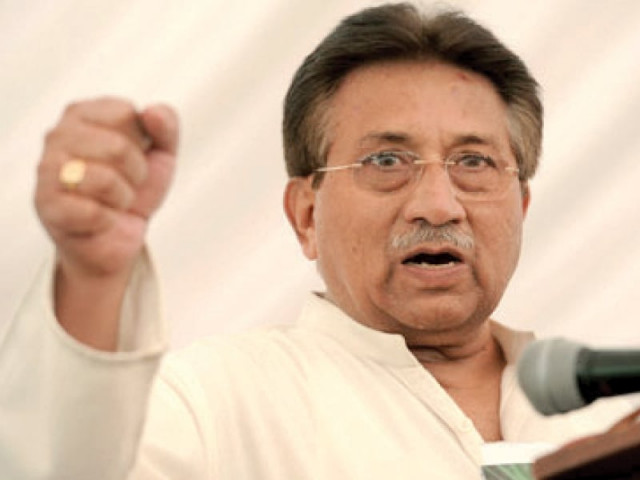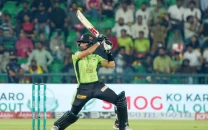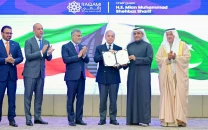Unprecedented trial: Special court formed to try Musharraf for treason
Justice Faisal Arab of SHC will head the special court.

Legal experts are divided on whether only Musharraf should be tried. PHOTO: FILE
The process for the first treason trial of its kind in Pakistan took a giant leap on Tuesday when a three-judge special court was constituted to prosecute former military ruler Pervez Musharraf under Article 6 of the Constitution.
The development came hours after Chief Justice Iftikhar Muhammad Chaudhry forwarded the names of five judges he received from the chief justices of the high courts.
Justice Faisal Arab of the Sindh High Court (SHC) will head the special court which will include Justice Syeda Tahira Safdar of the Balochistan High Court (BHC) and Justice Yawar Ali of the Lahore High Court (LHC) as its members. The two judges dropped from the list were Justice Yahya Afridi of the Peshawar High Court (PHC) and Justice Noorul Haq Qureshi of the Islamabad High Court (IHC).
The names were proposed by the chief justices of the five high courts of the country a day after Chief Justice Iftikhar Muhammad Chaudhry directed them to put forward the names of any judges eligible for the special court by Wednesday.
On Tuesday, the top court sent a letter to the federal interior secretary asking the government to pick three judges out of the five and also appoint the head of the trial court on the basis of seniority.
Initially, Interior Secretary Barrister Zafarullah Khan said that it was not necessary to refer the matter to the prime minister for approval. However, it was Nawaz Sharif who approved the final names. According to a statement issued from the Prime Minister’s Office, the judges were selected on the basis of seniority.

Interestingly, in its letter to the Supreme Court, the interior ministry had said on Monday that since there are five high courts in the country, it would be difficult for the government to nominate three judges for the special court.
“It is, therefore, requested that the instant matter may please be placed before the chief justice of Pakistan for the nomination of three judges from high courts. It is also requested that out of three judges, one may be nominated to be the president of the special court,” the letter stated.
According to the procedure, once the special court is set up, the interior secretary will file a complaint against Musharraf. The government has already appointed Zulfiqar Abbas Naqvi as prosecutor who will present evidence against the former army chief.
What legal experts say
Constitutional law experts have questioned the modus operandi adopted by the government for trying Musharraf for treason. “The government’s move to approach the Supreme Court for the establishment of the special court was illegal,” says former law minister Khalid Ranjha.
Abdul Hafeez Pirzada, one of the architects of the 1973 Constitution, concurs. “Since the treason trial has no precedence [in Pakistan’s judicial history], the government is confused,” he told The Express Tribune. “It’s clearly mentioned in Article 6 of the Constitution that it will be implementable from March 23, 1956,” he added, hinting that if the government invokes Article 6, it has to be invoked in retrospect.
Another legal guru, however, disagrees. “Musharraf cannot be tried for treason because the 18th constitutional amendment has done away with the condition of Article 6 being applicable in retrospect,” senior lawyer S M Zafar told The Express Tribune. “Musharraf never abrogated the Constitution, he just suspended it or held it in abeyance.”
Malik Muhammad Qayyum, who was the attorney general of Pakistan when Musharraf imposed emergency rule in 2007, refused to comment on the issue. He has been quizzed by investigators in the case.
Legal experts are also divided on whether only Musharraf should be tried or his accomplices should also be made part of this unprecedented case. A senior lawyers’ leader said that dragging other people into the case would politicise it and it would not be possible for the judges sacked during the 2007 emergency to adjudicate the case impartially.
In its July 31, 2009 verdict the Supreme Court had declared Musharraf’s November 3, 2007 steps ultra constitutional (illegal) which could be cited as the prime evidence against him. However, the Supreme Court will be the final court of appeal in this case that means if the trial court announces a decision it can be challenged in the Supreme Court.
Justice Syeda Tahira Safdar

Born in Quetta in 1957, Balochistan’s first female judge, Justice Safdar, attended the Cantonment Public School and went on to complete her Bachelor’s degree from the Government Girls College in Quetta.
After finishing her Masters in Urdu Literature from the University of Balochistan, she studied Law in 1980 at the University Law College in Quetta.
The daughter of lawyer Syed Imtiaz Hussain Baqri Hanafi, Justice Safdar started her career as the province’s first female civil judge in 1982. Within five years, she was promoted to senior civil judge and then as additional district and sessions judge in 1991. In March 1996, she was once again promoted as district and sessions judge.
Justice Safdar also worked as a presiding officer in the Labour Court. She was appointed a member of the Balochistan Services Tribunal from 1998 until she was appointed chairperson of the Balochistan Services Tribunal in 2009.
Justice Faisal Arab

Arab was among those judges of the superior judiciary who were deposed for refusing to take oath under the Provisional Constitutional Order (PCO) under former president and army chief Gen (retd) Pervez Musharraf proclaimed emergency on November 3, 2007. He rejoined office in 2008 when he took a fresh oath following his ‘reappointment’.
With a legal career spanning 23 years, Justice Arbab’s journey began when he worked as an associate at the law firm of Justice (retd) Fakhruddin G Ebrahim, after which he opened his own firm. Having practiced in the subordinate and superior judiciary, he was appointed as the standing counsel for the federal government in 2004-2005. Arab was elevated to the Sindh High Court as additional judge on October 25, 2005, and became permanent upon confirmation after one year. He became the senior puisne judge when Justice Baqar was elevated to provincial chief justice on September 21 this year.
Justice Muhammad Yawar Ali

Born in 1956, Justice Ali who studied Law at the University of Leeds in the United Kingdom. He was elevated as a Lahore High Court judge on February 19, 2010 and will retire on October 22, 2018. He has served as standing counsel and a deputy attorney general in Punjab.
He is the son of former Chief Justice of Pakistan Yaqoob Ali Khan. He is also the brother-in-law of Justice (retd) Khalilur Rehman Ramday, who gave the judgment to restore Chief Justice Iftikhar Muhammad Chaudhry when he was made dysfunctional by Musharraf.
Published in The Express Tribune, November 20th, 2013.



















COMMENTS
Comments are moderated and generally will be posted if they are on-topic and not abusive.
For more information, please see our Comments FAQ